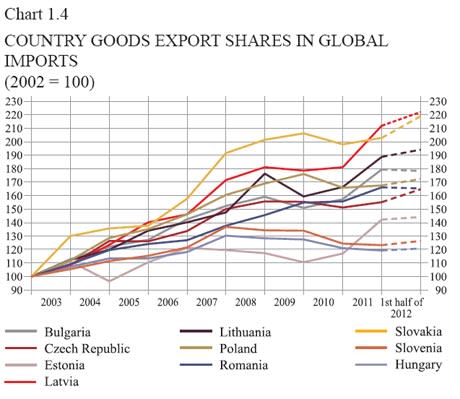Congratulations to both Iceland and Latvia
(アイスランドとラトビアにおめでとう!)
By Ambrose Evans-Pritchard Economics
Telegraph Blog: Last updated: October 22nd, 2012




(アイスランドとラトビアにおめでとう!)
By Ambrose Evans-Pritchard Economics
Telegraph Blog: Last updated: October 22nd, 2012
Iceland's unemployment rate has fallen to 5pc.
アイスランドの失業率が5%まで下がりました。
The country has maintained its social cohesion and prevented the wastage of job skills. It has lessened "hysteresis" damage of deep slump on the supply-side economy.
この国は社会的団結を維持し、仕事に関する技術、能力が無駄になるのを防ぎました。
アイスランドはサプライサイド・エコノミーに対する深刻な不況の「ヒステリシス」ダメージを軽減しました。
The crisis strategy allowed the exchange rate to take the hit (36pc trade-weighted devaluation), not the work force.
この危機戦略のおかげで、労働者ではなく為替レートにダメージが及びました(36%の貿易加重デバリュエーション)。
Iceland has recovered its investment grade credit rating of BBB-. The economy grew 2.6pc last year (IMF) and should achieve the same again this year. (It contracted 15pc peak-to-trough)
アイスランドはBBB-の投資適格格付けを奪還しました。
同国経済の昨年の成長率は2.6%(IMF調べ)。
今年も同水準の成長率を達成するはずです。
(ピークから底までは15%縮小しました。)
Interestingly, the GDP recovery in Latvia is in many ways comparable – though certainly not better, as some claim.
興味深いことに、ラトビアのGDPの回復は多くの意味で類似しています…尤も、一部の人が言うような、アイスランドを上回るものでは絶対にありません。
Here is a chart that Paul Krugman posted and which seems to have infuriated a lot of people:
以下は、ポール・クルーグマン教授がアップロードした、また、多くの人を激怒させたらしいグラフです。
Latvia's slump was much deeper (22pc of GDP peak-to-trough) but the rebound was stronger. Real output is still far from regaining its previous peak.
不況はラトビアの方が遥かに酷かった(ピークから底まで22%の縮小)のですが、回復はもっと堅調でした。
実質成長率は前回のピークをまだまだ大きく下回っています。
The difference is the internal composition. By clinging to the euro peg for ideological reasons, the stress was concentrated in unemployment instead.
違いは構成です。
イデオロギー的な理由のためにユーロにしがみつくことで、負担は失業率に集中してかかりました。
The definition of an "internal devaluation" on a currency peg is pushing unemployment to such excruciating levels that it breaks the back of labour resistance to pay cuts.
通貨のペッグ制における「域内デバリュエーション」の定義は、賃金引き下げに対する労働者側の抵抗する気力を挫く耐え難い水準にまで、失業率を押し上げることです。
OK, it can work (provided total debt levels are not too high), but look at how it works. Britain tried this after going back on Gold at an overvalued rate in 1925 and it led to the General Strike of 1926, the closest England has been to civil conflict in 200 years (since Peterloo).
はいはい、そのやり方は上手く行きますよ(債務残高が余りにも多くないことが条件ですが)、でも、どんな風に上手く行ったか見て下さい。
英国は、1925年に通貨が過大評価された状態で金本位制に戻った後、これを試しましたが、1926年にゼネストを引き起こすことになりました。
我が国が(ピータールーの大虐殺以降の)200年間で最も内戦勃発に近付いた瞬間でした。
Latvia's jobless rate reached 20.5pc and remained high for long enough to inflict lasting social damage. It is still 12.9pc.
ラトビアの失業率は20.5%に達し、長引く社会的ダメージを与えるに十分な期間、高失業率状態は続きました。
また、今も12.9%あります。
You can argue that Latvia's success in holding the euro peg vindicates the strategy, but you can equally argue that trying to hold an arbitrary peg is not a sensible thing to do in the first place. (Unless your objective is strategic and political: ie locking deeply into the EU system to deter Russia.)
ラトビアがユーロ残存に成功したことはその戦略の正しさを証明していると仰ることは出来るでしょうが、そもそも恣意的な固定為替制度を維持しようとすることは賢明なことではないと論じることも同じくらい可能です。
(あなたの目的が戦略的、政治的ではない限り、つまり、ロシア抑止のためにEUシステムとがっちりつながっていることでない限り…。)
We should be careful about using either Iceland or Latvia to draw too many sweeping conclusions. (I have been guilty of this in the past, though the EU authorities have been guilty as well – citing Latvia as their pin-up story.)
余りにも沢山の一般的な結論を導き出すためにアイスランドまたはラトビアを用いることについて、我々は慎重にならなければいけません。
(僕はこれについて過去に失敗しましたが、EU当局も失敗しています…ラトビアをピンナップ物語として採り上げたんですから。)
Iceland is sui generis, with cheap geothermal energy that gives it a global edge in aluminium output, lots of fish, and many other quirks.
アイスランドは独特で、アルミニウムの生産活動で世界的に有利な安価な地熱エネルギー、沢山の海産物、そしてその他多くの変わったものがあります。
Latvia is sui generis because Swedish banks own much of the banking system, and because it is surrounded by Nordic countries and by Poland, which have their own currencies and have (therefore?) weathered the crisis well. It trades heavily with Russia.
ラトビアは独特ですが、これはスウェーデンの銀行が同国銀行システムの大半を所有しているからであり、また、独自の通貨を有していて、(それが故に?)今回の危機を上手に乗り越えている、北欧諸国とポーランドに取り囲まれているからです。
ラトビアはロシアとも沢山取引しています。
It is a food exporter, up 27pc in the last year. It has an open trade economy with a high export gearing. Overall export growth has been stellar as you can see from this chart from the Latvia central bank:
この国は食品輸出国で、昨年は27%に上りました。
また、輸出重視のオープン・トレード・エコノミーです。
全体的な輸出成長率は、下のラトビア中銀がまとめたグラフでわかるように、非常に素晴らしい実績です。
It is also a catch-up convergence play with a per-capita income still a fraction of the EU average. This catch-up effect was interrupted but not stopped by the 2008-2009 crisis.
また、ラトビアは国民一人当たりの所得が未だにEU平均の数分の一であり、他国を追いかける立場にあります。
このキャッチアップ効果は2008-2009年の危機に邪魔されましたが、止められることはありませんでした。
Congratulations to both of them. What the two countries have (and Greece, Portugal, and Spain do not have) are open economies.
両国を賞賛しましょう。
この二つの国が持っているのは(そしてギリシャもポルトガルもスペインも持っていないのは)オープン・エコノミーです。
Let us call it a draw on points.
引き分け判定としましょう。
Editors' Pick: Iceland win on labour style.
筆者の個人的見解: 働き方はアイスランドの勝利だと思います。























